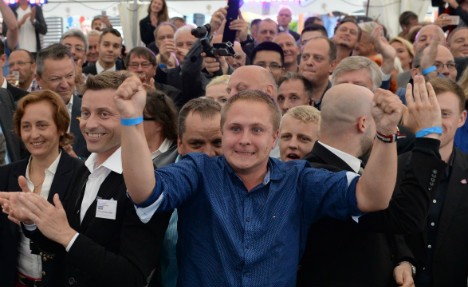After the far-right Alternative for Germany (AfD) beat Angela Merkel’s CDU into third place in a state election on Sunday, minority groups have been reacting with concern.
“That an extreme-right party which blatantly incites hatred against minorities in a disgusting way can rise unhindered in our country is a nightmare come true,” Charlotte Knobloch, President of the Jewish Community of Munich and Upper Bavaria (IKG), said on Monday.
Knobloch was responding to news that the AfD won about 21 percent of the vote in state elections in Mecklenburg-Western Pomerania, coming second to the Social Democrats (SPD), who won with 30 percent of the vote. Merkel’s CDU mustered only a 19 percent vote share.
“The AfD is an openly far-right party. It is pathetic when a party – in which xenophobia, antisemitism, racism, H0mophobia, historical denialism and conspiracy theories are the basis for argument – can become such a strong social and political influence,” she said.
Knobloch warned that, in collaboration with other far-right parties, the AfD had the strength to threaten Germany’s democratic foundations.
Josef Schuster, President of the Central Council of Jews in Germany, also expressed concern at the result.
“Clearly many voters are not aware or play down the fact that the AfD do not clearly distance themselves from right-wing extremists, in Mecklenburg-Western Pomerania or anywhere else in the country,” he said.
AfD party leader Frauke Petry, meanwhile, announced on Monday that “Merkel has brought herself down” in reference to the fact that the northeastern state is where the Chancellor holds her seat in the German parliament.
“The Chancellor and the SPD are leading German citizens on, whether it be in the financial crisis or the refugee crisis,” Petry told broadcaster Phoenix.
The main political parties are involved in “surrendering this country,” she claimed.
CDU leaders called for patience on Monday, saying the party needed more time to overcome the refugee issue.
“It’ll take time before all our measures work, and it’ll take time before the trust we have lost can be won back,” CDU General Secretary Peter Tauber said.
The CDU has already made significant progress on the refugee issue, including drastically reducing the number of refugee arrivals and tightening the right to asylum while also bringing in a new law on integration, he argued.
The AfD was founded in 2013 as a eurosceptic party that advocated a return to the Deutsche Mark, but it has since shifted to become a mainly anti-immigration and Islamophobic party.
It has grown strongly even as its top members have sparked outrage with insulting remarks, including one disparaging star footballer Jerome Boateng, who is of German and Ghanaian descent.
The right-wing populist party is the first to establish itself in the German political landscape since the Second World War, after decades in which no such party crossed the five percent hurdle to enter national parliament.
At national level, it is now polling at 14 percent according to a September survey, a gain of 10 points in the year since Merkel threw open German borders to a mass influx of asylum seekers.




















